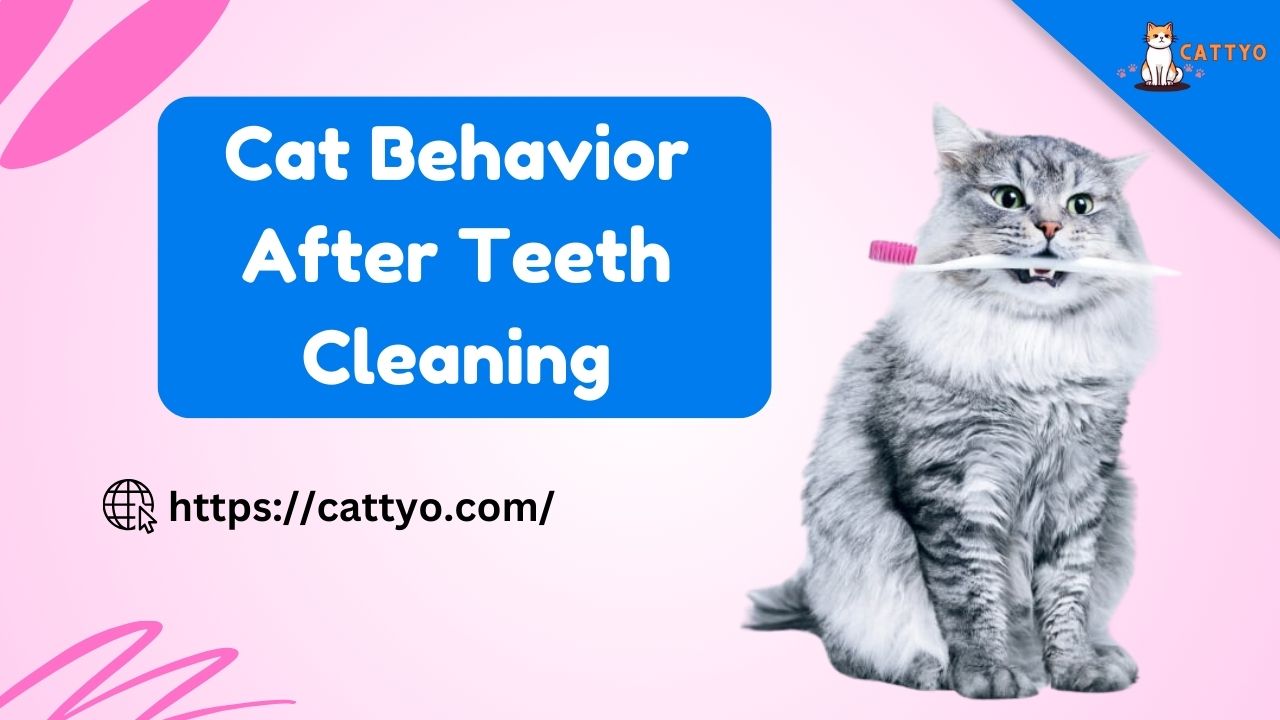Have you ever wondered how your cat’s behavior changes after they’ve had their teeth cleaned?
It’s not exactly a topic that comes up in casual conversation, but as a pet owner, it’s one of those things that can make a huge difference in your cat’s health—and their mood.
Whether your cat is heading to the vet for a routine cleaning or you’re simply curious about how they might feel afterward, it’s important to understand the potential changes in their behavior.
So, let’s dive into what you can expect and how to help them recover!
Understanding the Importance of Dental Care for Cats
Before diving into the behavioral changes, let’s first understand why dental care is so crucial for cats.
Cats, like people, can suffer from dental problems that can lead to discomfort, pain, and even systemic health issues if left untreated. Dental diseases such as gingivitis or periodontal disease can make a cat irritable or lethargic and even affect their ability to eat.
Getting their teeth cleaned, therefore, isn’t just about keeping their smile shiny—it’s essential for their health and happiness.
How Teeth Cleaning Affects Your Cat’s Behavior
So, what exactly happens to a cat’s behavior after teeth cleaning? It’s common for cats to experience some temporary changes, as their mouths and gums are sensitive after a cleaning procedure.
Here’s a breakdown of what you might notice:
1. Increased Comfort and Relief
After a thorough cleaning, your cat may feel a sense of relief if they had been suffering from oral discomfort.
Cats are notoriously good at hiding pain, so it’s possible that your feline was struggling with dental issues, such as gum inflammation or infected teeth, without you realizing it.
Once those issues are addressed, you may notice that your cat becomes more active, playful, and social, displaying behavior that suggests they feel more comfortable.
2. Possible Lethargy or Disorientation
It’s also not uncommon for cats to feel a bit groggy or disoriented after the procedure. The anesthesia used during the cleaning can leave them feeling a bit out of sorts for a while.
This could lead to a temporary decrease in activity levels, and your cat might spend more time resting or sleeping than usual.
3. Eating and Drinking Behavior Changes
One thing you’ll likely notice right away is how your cat eats and drinks after teeth cleaning.
If your cat had oral pain before the procedure, they may be hesitant to eat or drink right after the cleaning, especially if their gums are a bit sore.
This is completely normal and should pass after a day or two.
However, once they start feeling better, you might notice they are more eager to eat, and you may even see them trying to eat things they typically wouldn’t have before because they’re no longer in pain.
It’s also possible that your cat will show more interest in chewing their food if they’ve had difficulty chewing due to dental issues.
Common Behavioral Changes You Might Notice
After a dental cleaning, there are a few more specific behaviors you might notice in your cat.
These changes could be temporary or might last for a while, depending on the cat’s personality and how well they recover from the procedure. Here’s a look at the most common ones:
4. Aggression or Irritability
Just like humans, cats can become grumpy or irritable when they’re not feeling their best.
If your cat is feeling discomfort from sore gums or lingering anesthesia effects, they might display behaviors like hissing, swatting, or avoiding interaction.
It’s essential to give them time to recover and avoid pushing them for affection or playtime until they’re ready.
5. Excessive Grooming or Mouth-Rubbing
After teeth cleaning, it’s possible that your cat might be more focused on grooming or rubbing their mouth area as they adjust to the sensation of their freshly cleaned teeth.
They may feel strange or sensitive in their mouth, and you might even see them licking their lips or rubbing their face against furniture.
Is There Any Way to Help Your Cat Adjust?
As a loving pet owner, it’s natural to want to help your cat through any discomfort they may experience after a dental cleaning. Here are some ways you can make the process a little easier for them:
- Provide Soft Food: For the first few days after the cleaning, opt for soft foods that are easier for your cat to eat. This can help prevent discomfort when chewing and encourage your cat to eat.
- Keep Their Environment Calm: If your cat seems a bit more sensitive or withdrawn, create a quiet, comfortable space for them to relax. Avoid loud noises or sudden movements that might startle them.
- Offer Fresh Water Regularly: Dehydration can be an issue after anesthesia, so make sure fresh water is always available for your cat, and encourage them to drink.
The Importance of Dental Care for Cats
Before we get into the behavior changes, let’s take a minute to talk about why teeth cleaning is so crucial for cats. Just like us, cats need regular dental care to keep their teeth and gums healthy.
Without it, they can develop a variety of dental issues, from gum disease to tooth decay, which can lead to serious health problems, including difficulty eating, bad breath, and even infections that affect other parts of the body.
Regular dental cleanings help remove plaque and tartar buildup, which can lead to gingivitis or more severe conditions like periodontal disease.
So, while it may seem like an unnecessary expense, it’s actually one of the best things you can do for your cat’s long-term health.
Cat Behavior After Teeth Cleaning: What’s Normal?
Once your cat’s dental cleaning is done, you might notice a few changes in their behavior. Some of these changes are temporary, while others may signal something more significant. Here’s what you can typically expect:
1. More Playful or Active (After the Initial Recovery)
If your cat had been dealing with dental pain before the cleaning, you might notice that they become a lot more active and playful once they’ve fully recovered. Dental issues can make cats irritable and lethargic, but once their teeth are cleaned and their gums are healthier, they may feel more comfortable and energetic.
Real-life example: I’ve had a cat, Bella, who used to hide under the bed whenever she was feeling unwell. After her teeth were cleaned, she came out like a new cat—chasing toys and zooming around the house like a kitten again!
2. Temporary Lethargy or Grogginess
It’s also common for cats to feel a little groggy after a cleaning, especially if they were put under anesthesia for the procedure.
Just like when you wake up from a nap and feel a bit out of sorts, your cat might spend a few hours or even a day feeling a little more tired than usual.
If your cat is sleepy, don’t worry. Just make sure they have a quiet, safe place to rest where they won’t be disturbed.
3. Changes in Eating and Drinking Habits
After a dental cleaning, you might notice that your cat isn’t eating or drinking as much as usual. This could be due to the sensitivity of their gums.
Just like how we might avoid chewing on hard foods after a dental procedure, your cat might be reluctant to eat dry kibble or other harder foods immediately.
Tip: Offering wet food or soft treats for the first couple of days can help make the process easier on their sensitive mouths.
4. Mouth-Rubbing and Excessive Grooming
After a teeth cleaning, your cat might be a little more focused on grooming or rubbing their face. This is a normal reaction as they adjust to the sensation of their cleaned teeth and gums.
They might also lick their lips more often or paw at their mouth area to try and relieve any leftover discomfort.
5. Mild Irritability or Aggression
Like humans, cats can become cranky when they’re not feeling their best.
If your cat is showing signs of irritation or aggression, it’s likely because they’re still adjusting to the after-effects of the cleaning or recovering from the anesthesia.
They might not want to be handled, so give them space to relax and recover in peace.
How to Help Your Cat After Teeth Cleaning
Now that we’ve covered the potential behavioral changes, let’s look at how you can help your cat adjust and recover comfortably.
1. Provide a Calm, Comfortable Space
After the procedure, your cat will need time to recover from the anesthesia and adjust to the feeling of their freshly cleaned teeth.
Set up a quiet, cozy space where they can rest without being disturbed by other pets or loud noises. You’ll also want to avoid introducing any new experiences or activities during this time.
2. Offer Soft Foods
As mentioned, your cat’s mouth may feel sore for a while after the cleaning. Offer soft foods, like wet cat food or boiled chicken, to make eating easier. Gradually reintroduce their regular food as they start feeling more comfortable.
3. Encourage Hydration
It’s important to make sure your cat stays hydrated, especially if they aren’t eating as much right away.
Fresh water should always be available, and you might want to try a water fountain to encourage them to drink more.
4. Be Gentle During Playtime
While your cat may start feeling more energetic as they recover, it’s essential to be gentle with them during playtime.
Avoid rough play or activities that could irritate their mouth. Opt for soft toys and slow-paced games to help them regain their energy.
Why It’s Important to Stay on Top of Dental Care
Now that you’ve seen how teeth cleaning can impact your cat’s behavior, it’s clear that regular dental care is more than just about a clean mouth.
It can contribute significantly to their overall well-being and happiness. Cats are living longer than ever before, and with the right dental hygiene, they can enjoy a higher quality of life.
How Long Does It Take for Cats to Recover After Teeth Cleaning?
Most cats will begin feeling back to normal within 24 to 48 hours after their dental cleaning.
However, if you notice that your cat is still acting lethargic or having trouble eating after this period, it’s a good idea to contact your vet to make sure everything is healing properly.
Common Questions About Cat Behavior After Teeth Cleaning
Q: My cat seems to have bad breath even after a cleaning. Is this normal?
A: It’s not uncommon for cats to have a bit of bad breath immediately after a cleaning. The cleaning process can sometimes stir up bacteria in the mouth.
However, the bad breath should improve as the mouth heals. If it doesn’t, or if you notice persistent signs of gum disease (like swelling or bleeding), contact your vet.
Q: Will my cat’s behavior return to normal after recovery?
A: Yes, once your cat has recovered from the anesthesia and any discomfort, their behavior should return to normal. In fact, they might even seem more lively and playful than before!
Q: Is it okay to brush my cat’s teeth after a cleaning?
A: It’s best to wait a few days after the cleaning to give your cat’s gums time to heal. After that, regular brushing (using cat-specific toothpaste) can help maintain their oral health.
Q: How often should my cat have their teeth cleaned?
A: The general recommendation is to have your cat’s teeth professionally cleaned every 1-2 years, but this can vary based on your cat’s breed, age, and overall health. Ask your vet for personalized advice.
Final Words
In the end, the changes in your cat’s behavior after a teeth cleaning are typically short-term and well worth the effort.
While it’s normal for them to feel a bit off after the procedure, the long-term benefits of a cleaner, healthier mouth will make them feel better in the long run.
And hey, maybe they’ll even give you a little extra cuddle time once their teeth are all sparkling clean!
By providing a calm, supportive environment and offering plenty of soft food and water, you can help your cat through the recovery process with ease.
Remember, a healthy smile isn’t just about looks—it’s a huge part of your cat’s overall well-being.





